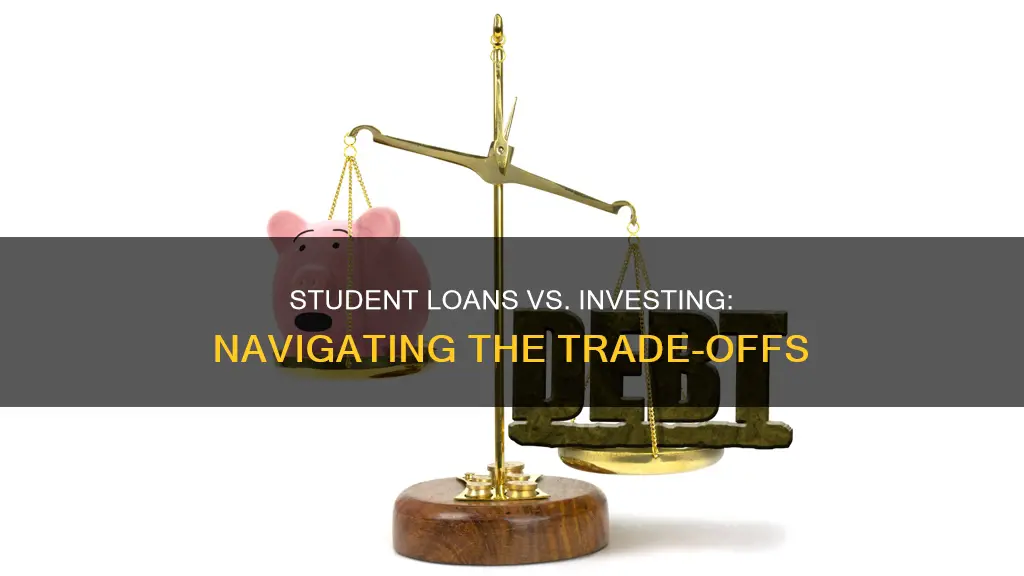
Should you pay off student loans or invest?
It's a tricky question and the answer depends on your financial situation and goals. If you're unsure, it's best to consult a financial advisor. However, here are some factors to consider when deciding whether to pay off student loans or invest.
Interest rates
One important factor is the interest rate on your student loans. If you have high-interest student loans, especially private loans, it might be a good idea to focus on paying them off first. On the other hand, if you have a low-interest rate on your student loans, investing your money could be more beneficial in the long run.
Financial goals
Another thing to consider is your financial goals and priorities. Do you want to be debt-free as soon as possible, or are you more interested in building wealth for the future? If you need to get out of debt to qualify for a mortgage or other financial goals, paying off your student loans first might be the best option. However, if you're comfortable carrying some debt and want to start building an investment portfolio, investing could be a better choice.
Emergency fund
Before making any decisions, it's important to have an emergency fund in place. This will ensure that you have some savings to fall back on in case of unexpected expenses or financial difficulties.
Tax deductions and loan forgiveness
There are also tax implications to consider when deciding whether to pay off student loans or invest. Student loan interest may be tax-deductible, which could reduce your taxable income. Additionally, if you have federal student loans, you might be eligible for loan forgiveness programs, which could save you a significant amount of money in the long run.
Investing for retirement
If your employer offers a retirement plan, such as a 401(k), contributing to this plan could be a good way to invest for the future while also taking advantage of any employer matching contributions.
Refinancing student loans
If you're struggling to make your student loan payments, refinancing your loans could be an option to consider. Refinancing can lower your interest rate and monthly payments, making it easier to manage your debt. However, if you have federal student loans, refinancing with a private lender will cause you to lose access to federal benefits and protections, such as income-driven repayment plans and loan forgiveness programs.
| Characteristics | Values |
|---|---|
| Interest rates | Student loan interest rates vary, but a conservative but plausible return on investments is 6% per year. |
| Financial goals | Being debt-free, saving for retirement, saving for an emergency fund, saving for a house down payment, etc. |
| Emotional stress | Being debt-free can bring peace of mind and relieve stress. |
| Tax deductions | Student loan interest payments can be deducted from your taxable income, up to $2,500 per year. |
| Loan forgiveness | Federal student loans may be eligible for forgiveness after a certain number of qualifying payments. |
| Employer benefits | Your employer may offer student loan repayment assistance or 401(k) matching. |
What You'll Learn

Weigh up your financial goals and priorities
Before deciding whether to pay off student loans or invest, it's important to consider your financial goals and priorities. Do you want to become debt-free as soon as possible, or are you more interested in building wealth for the future? Are you comfortable with carrying some debt, or does the idea of having any debt cause you stress? Be honest with yourself about your priorities and what will bring you the most peace of mind.
If you're primarily focused on becoming debt-free, then paying off your student loans early may be the best option for you. This can be especially beneficial if you have high-interest student loans, an unpredictable cash flow, or you're looking to improve your debt-to-income ratio. Paying off your student loans early can save you money in interest charges and help you become debt-free sooner, allowing you to put more money toward other financial goals like investing or retirement.
On the other hand, if building wealth is your top priority, investing may be a better option. This is especially true if you expect your investments to earn a higher rate of return than the interest rate on your student loans. Investing early and consistently can help you take advantage of compound interest and potentially earn higher returns over time. Additionally, investing may be a good choice if you're enrolled in a student loan forgiveness program or have a low-interest rate on your loans.
Keep in mind that you don't necessarily have to choose one option over the other. It's possible to allocate a portion of your income towards both investing and paying down your student debt. This can be a good option if you want to balance your financial goals and work towards becoming debt-free while also building wealth for the future.
Reliance Industries: Invest Now?
You may want to see also

Compare interest rates
When deciding whether to pay off student loans or invest, it's important to compare interest rates.
Federal student loan interest rates
Congress sets federal student loan interest rates annually. These rates are determined using the 10-year Treasury note auction yield and other factors, and they apply to new federal loans disbursed from July 1 of the current year to July 1 of the following year.
- Direct Subsidized Loans: 5.23%
- Direct Unsubsidized Loans (undergraduate): 5.23%
- Direct Unsubsidized Loans (graduate or professional): 6.83%
- Direct PLUS Loans (graduate or parent): 7.83%
Private student loan interest rates
Private student loan interest rates vary depending on the lender and your financial profile. As of August 2023, average rates on private student loans range from just below 4% up to nearly 15%.
Private loan rates can be fixed or variable. While a fixed rate will stay the same throughout the life of the loan, a variable rate can fluctuate according to market conditions. This means your payments could rise or fall.
How to decide between paying off student loans or investing
If you have high-interest student loans, it's generally better to pay them off first. A conservative but plausible return on investments is 6% per year. If your student loan interest rates are higher than that, you’d save more money by paying them off — and avoiding interest charges — than by investing.
If your student loan interest rates are less than 6%, consider putting extra money toward retirement or a brokerage account for non-retirement investing. Over the long term, your investments could potentially earn more compared to the savings from paying off those loans.
Other factors to consider
- Emotional stress: Being debt-free can offer peace of mind.
- Loan forgiveness: If you're enrolled in a student loan forgiveness plan, investing rather than paying off your loans could make more sense.
- Financial goals: If your top priority is to be debt-free, you may want to hold off on investing and put all your excess funds toward paying off your student loans early.
Movie Investment: Why Take the Risk?
You may want to see also

Consider tax deductions
When deciding whether to pay off student loans or invest, it is important to consider the tax implications of both options. Here are some key points to keep in mind:
- Student Loan Interest Deduction: In the US, you may be able to deduct up to $2,500 of the interest paid on a qualified student loan from your taxable income. This deduction is available to individuals with a modified adjusted gross income (MAGI) of less than $90,000 for single filers or $185,000 for married couples filing jointly. The deduction amount is reduced if your MAGI is between $75,000 and $90,000 for single filers or between $155,000 and $185,000 for married couples filing jointly.
- Tax Filing Status: Your filing status can impact your eligibility for the student loan interest deduction. If you are married and filing separately, you are not eligible for the deduction. Additionally, the size of your monthly payments under an income-based repayment plan may depend on the combined incomes of both spouses, even if you file separately.
- Forgiven Debt: If you participate in an income-driven repayment plan or a student loan forgiveness program, your remaining debt may be forgiven after a certain number of years. However, this forgiven debt is usually considered taxable income, and you will need to pay taxes on it. There are some exceptions, such as the Public Service Loan Forgiveness Program and the Teacher Loan Forgiveness Program, where the forgiven debt is not taxable.
- Tax Credits and Deductions for Education: There are other tax benefits available to students and their parents, such as the American Opportunity Tax Credit and the Lifetime Learning Credit, which offer credits for qualified education expenses. Additionally, participating in a 529 Plan can provide tax advantages for parents saving for their children's education.
- Investment Tax Deductions: If you choose to invest, you may be able to take advantage of tax deductions for retirement contributions. For example, you can deduct contributions made to a 401(k) or a traditional individual retirement account.
When deciding between paying off student loans and investing, consider the potential tax benefits and implications of each option. Consult a financial advisor or tax professional to determine how these tax rules may apply to your specific situation.
MLS: The Next Big Investment Opportunity?
You may want to see also

Know your federal student loan benefits
Federal student loans offer a range of benefits that you should consider when deciding whether to pay off your student loans or invest.
Firstly, federal student loans have fixed interest rates, meaning the interest rate will not change over the life of the loan. This is not always the case with private loans, which can have variable rates. Fixed-rate loans protect you from sudden or significant increases in monthly payments if interest rates rise. Federal student loans also tend to have lower interest rates than private loans.
Secondly, federal student loans offer more borrower protections and flexible repayment options. For example, federal student loan borrowers have access to income-driven repayment plans, which cap payments at a certain percentage of the borrower's discretionary income. Federal student loans also give borrowers more time to make payments and take longer to default than private loans. Additionally, federal student loans offer deferment and forbearance options, allowing you to postpone payments for a certain period.
Another benefit of federal student loans is the availability of loan forgiveness programs. For instance, the Public Service Loan Forgiveness program allows borrowers to have their loans forgiven after a certain period of public service and qualifying monthly payments. Federal student loans can also be discharged in the event of the borrower's death or if the borrower can prove total and permanent disability.
Furthermore, federal student loans do not require a credit history or co-signer, making them more accessible to students who may not have an established credit history or the means to secure a co-signer.
Lastly, federal student loans offer the opportunity for interest accrual to begin after college. Students with financial need who receive subsidised federal loans do not pay interest while enrolled in school at least half-time. In these cases, the government pays the interest on the borrower's behalf.
When deciding whether to pay off student loans or invest, it is important to consider the benefits and protections offered by federal student loans, which can provide borrowers with greater flexibility and peace of mind.
Finding Your Ideal Investment Advisor
You may want to see also

Do your research
Before deciding whether to pay off your student loans or invest, it's important to do your research and understand your financial situation. Here are some key factors to consider:
- Your financial goals and priorities: Do you want to become debt-free as soon as possible, or are you more focused on building wealth for the future? Are there any other financial goals you need to consider, such as saving for a house or starting a family?
- Interest rates and potential investment returns: Compare the interest rates on your student loans with the potential returns on different types of investments. If you have high-interest student loans, it may be more beneficial to pay them off first. On the other hand, if you expect to earn higher returns on your investments than the interest rate on your student loans, investing may be a better option.
- Federal student loan benefits: If you have federal student loans, consider the various benefits and protections available, such as income-driven repayment plans, deferment options, and loan forgiveness programs. These benefits may influence your decision on whether to pay off your loans early or focus on investing.
- Your overall financial health: Evaluate your total debt, including credit card debt, auto loans, and other personal loans. Consider your monthly budget and how your student loan payments fit into it. Also, think about any consumer protections or government assistance programs you may be able to take advantage of.
- Emergency fund and savings: Before deciding to pay off student loans or invest, ensure you have an adequate emergency fund to cover unexpected expenses. It's generally recommended to have at least three to six months' worth of expenses saved. Additionally, consider building up savings for other financial goals, such as retirement or a down payment on a house.
- Tax implications: Understand the tax implications of both paying off student loans and investing. For example, you may be able to deduct up to a certain amount of student loan interest on your taxes. On the other hand, investing in a 401(k) or IRA can provide tax advantages and help reduce your taxable income.
By researching and considering these factors, you can make a more informed decision about whether to prioritize paying off your student loans or investing your money elsewhere.
Young Investors: Where to Begin?
You may want to see also
Frequently asked questions
Paying off student loans early can bring peace of mind and reduce the amount of interest paid over time. It can also help you save hundreds of dollars in interest and improve your debt-to-income ratio, making it easier to qualify for a mortgage.
Investing offers the potential for higher returns over time and can help you build wealth earlier. It also provides more flexibility in terms of withdrawal options and tax deductions. Additionally, investing in certain accounts, such as a 401(k), can result in employer-matching contributions, further increasing your savings.
When deciding between paying off student loans early or investing, consider your financial goals, interest rates, tax deductions, and loan forgiveness programs. Evaluate your overall financial health, including your total student debt, interest rate, and monthly budget impact. Compare the interest rates on your student loans with the potential investment returns. Additionally, consider whether you have access to federal loan forgiveness programs or income-driven repayment plans that may make it more beneficial to focus on investing.







